- GreenMatch
- EV Chargers: Your Ultimate Guide in UK
EV Chargers: Your Ultimate Guide

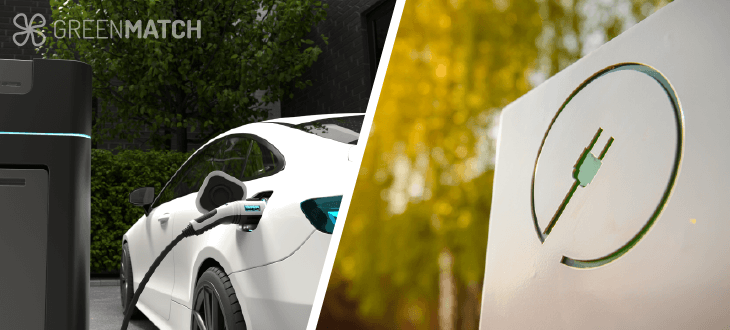
Electric vehicles are fast becoming one of the best ways to reduce carbon emissions worldwide. Their ability to get to us from A to B with zero emissions revolutionises the transport industry, responsible for 26% of the country's total emissions.
Switching to an electric vehicle can save up to 80% of the carbon emitted by a regular combustion engine. This is why the UK Government have set ambitious plans to ensure all new cars sold by 2035 will be zero-emission vehicles.
However, one key component of this mission will be to ensure access to adequate charging stations. In recent years, EV chargers (or electric vehicle chargers) have become commonplace in garages and large car parks, but many people still need to be convinced to use them.
Despite an impressive growth in charging stations of 43% in the last year, drivers still have anxiety about the availability of public charging ports. Fears of being left with a flat battery have created anxiety and a significant barrier for people to transition to an electric vehicle.
In this article, we'll explore exactly what the UK electric vehicle charging landscape looks like. How many charging points nationwide, and how easy can they access? We'll also break down different types of chargers and discover the benefits of home charging. In this guide, we'll answer all your questions and look further at the future of electric vehicles in the UK.
Number of EV charging stations
It's estimated that there are approximately 950,000 electric cars on the roads in the UK, indicating the need for adequate charging stations. The good news is that by the end of November 2023, the UK had 53,029 public-use electric charging points found across nearly 31,000 locations. This marks an increase of almost 50% from the previous year's figures.
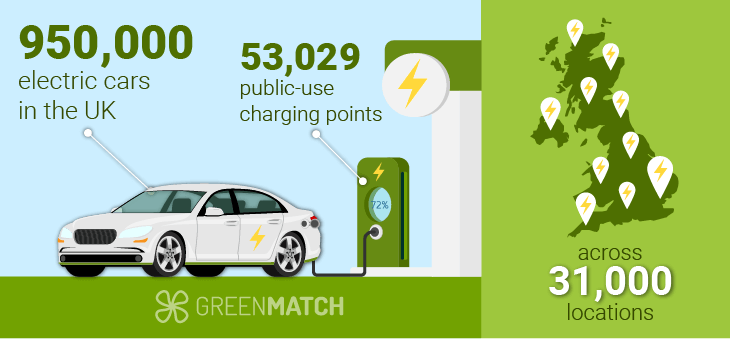
UK charging points by geographical area
Some regions across the UK have more charging points than others. For example, in the table below, sourced via Zapmap, we can see that Greater London has the most charging points, with over 18,000 recorded as of November 2023.
In contrast, perhaps unsurprisingly, more remote areas such as the Isle of Man have less than 100. This shows us that location is likely to impact the uptake of electric vehicles if access to charging points isn't readily available.
| Region | Number of Devices | Percentage |
|---|---|---|
| Greater London | 18,396 | 34.7% |
| South East | 6,137 | 11.6% |
| Scotland | 4,495 | 8.5% |
| West Midlands | 4,090 | 7.7% |
| South West | 3,517 | 6.6% |
| East of England | 3,474 | 6.6% |
| North West | 3,435 | 6.5% |
| Yorkshire and the Humber | 2,738 | 5.2% |
| East Midlands | 2,418 | 4.6% |
| Wales | 2,206 | 4.2% |
| North East | 1,479 | 2.8% |
| Northern Ireland | 445 | 0.8% |
| Channel Islands | 102 | 0.2% |
| Isle of Man | 97 | 0.2% |
Map of UK charging stations
We've provided an interactive map below to show how many EV charging stations are near you clearly. Click on your region (labelled by constituency area) to see the number of charging points.
The simplest and quickest way to find a station near you is to download an app or visit a website which helps you locate your nearest charging points. Below are some of the top-rated sites you can use:
Each one will show you the latest data, the full range of charging types and their current availability. In addition, it's thought that there are over 680,000 charging points installed in homes or at office locations, some of which may be free to use.
Types of EV charging stations
There are several ways to charge your electric vehicle. These include at-home and public chargers in large car parks or local fuelling stations. You must understand key features to pick the right charging point wherever you charge your vehicle.
You may need to bring your charging cable along in your car in case the point you find doesn't have one or doesn't have the right connection for your vehicle. You'll also need to know what charge speed and connection your vehicle needs.
As many EV chargers are available for public use, it can be unclear to make sense of. To make this easier, we've detailed each type below.
Home chargers
There are two main at-home chargers: plug into a standard home socket or install an EV charger.
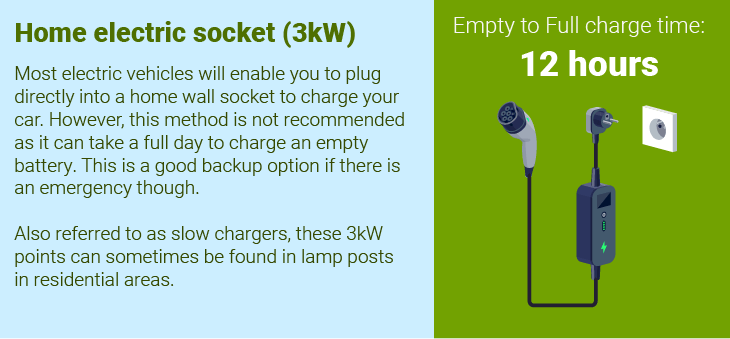
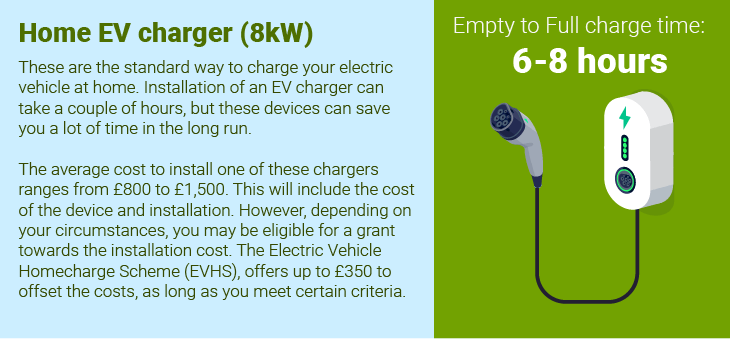
The Government has recently introduced new ‘Public Charge Point Regulations’. As part of this, new categories have been given to chargers based on their output. These categories will eventually replace current definitions. However, as both are still currently in use, we have included the old ones within this guide for clarity.
The new definitions are as follows:
- 3 kW to 8kW – formerly ‘slow charging devices’
- 8kW to 49kW – formerly ‘fast charging’
- 50kW to 149kW – formerly ‘rapid charging’
- 150kW and above – formerly ‘ultra-rapid charging’
Public chargers
Public chargers are usually defined by their kilowatt power, and depending on the battery size of your electric vehicle, some will be better suited than others.
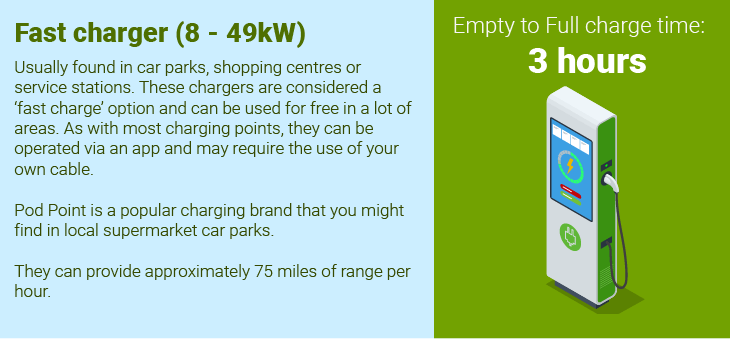
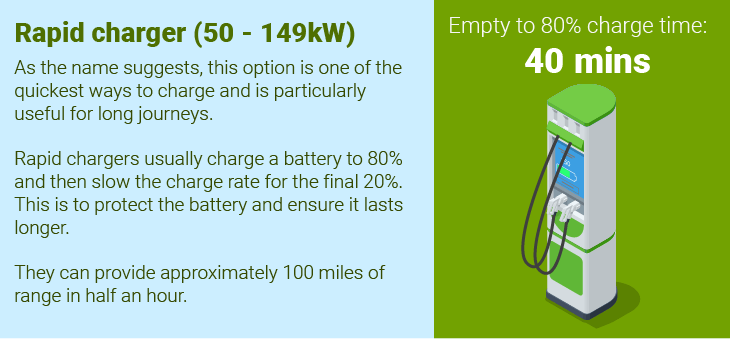
The size of your car battery will determine the maximum amount of power it can hit. Regardless of whether you choose an ultra-rapid charger, your battery may not be able to reach the high output levels it provides.
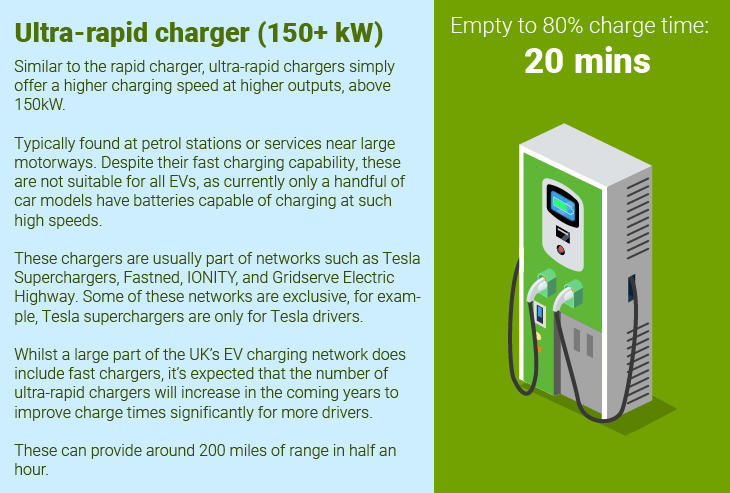
Revenue forecast
As we’ve seen, many charging points are readily available across the country, and several types of charging suit every need, but will this trend continue?
A good way to assess the growth of our EV charging infrastructure is to look closely at revenue forecasts for the coming years. This gives insight into how the market hopes to tackle increased demand, particularly in light of recent government commitments to ban the sale of new petrol and diesel cars between 2030 and 2035.
This plan aims to accelerate the uptake of green transport options, so how will this affect the EV charging industry? Recent reports suggest the UK EV charging market is expected to grow by 19.35% (CAGR) by 2028 at approximately £1,072.647 million.
Below is a projection of revenue growth of UK EV charging stations between 2016 and 2027. There is a rapid increase from 2021 onwards, with predicted revenues of around £296.9 million in the next 4 years.
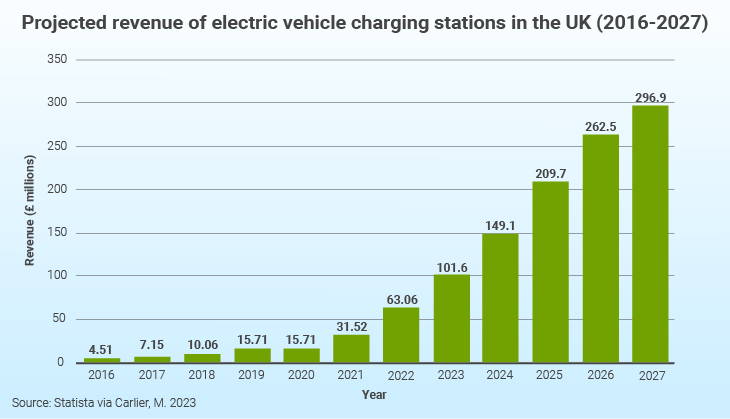
Market reports indicate that this growth has been caused by large company investments in recent years. Some of these notable commitments include:
-
ChargeUK will invest £6 billion into EV charging infrastructure by 2030.
-
BP Pulse is adding high-speed EV charge stations to over 70 M&S stores. M&S will invest £1 billion in EV infrastructure by 2030.
-
Swarco Smart Charging launched PoGo in February 2023, setting up more than 12,000 charging stations in the UK.
- Shell committed a £250 million investment in the UK's charging network over the next five years to install 50,000 new charging points.
With this increase in investments and predicted market growth, hopes are high for the future of our EV infrastructure if we continue to progress at this rate.
Types of charger connection plugs
In addition to knowing which speed of charge your EV needs, you will also need to know what kind of connection (or plug type) it uses. Much like every car takes specific tyres, your vehicle will come with all the information you need to find the right charging connection (this is just like picking the correct fuel pump at the garage).
There are 4 main connection types, which correlate to charge speed. We’ve detailed these types below with examples of how they each look. Different connection options may be available at the station point depending on the charge speed and type of charger you use.
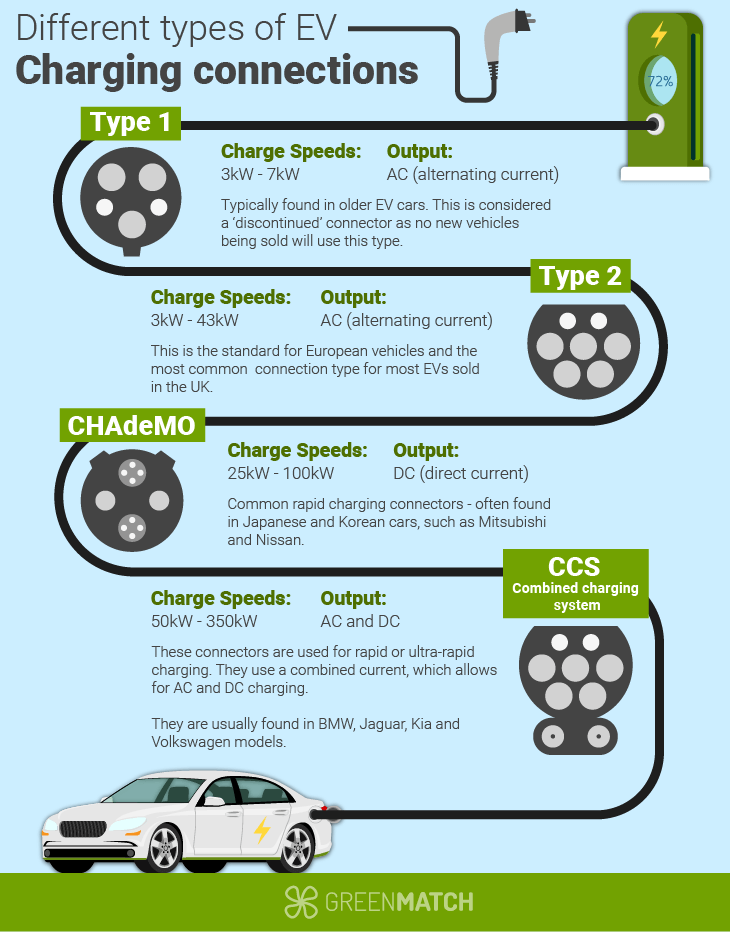
Cost to charge an electric car
Owning an electric vehicle saves money on highly volatile traditional fuel costs. However, many wonder, ‘How much does it cost to charge an electric car?’.
Free charging points are available across the country. However, these are typically found in places known as ‘destination charging’ points. These are places where you will park for a limited amount of time, such as supermarket car parks, office buildings, hotels, etc. For example, they allow you to recharge while shopping or working.
These are highly convenient ways to keep your car topped up. However, costs are involved if you’re making long journeys or needing to charge your car overnight at home. For example, ‘on the go’ charging stations, which are those found at service stations or garages, usually offer higher speed chargers at a price.
Many EV chargers work alongside an app or contactless payments for easy use. However, some older charging stations can require membership or pre-payment cards (luckily, these are being phased out).
How much you pay to charge an EV will depend on several factors, such as where you charge, the price of electricity at the time and what type of charger you use.
According to industry experts, Zapmap, as of November 2023, charging through the public network cost on average:
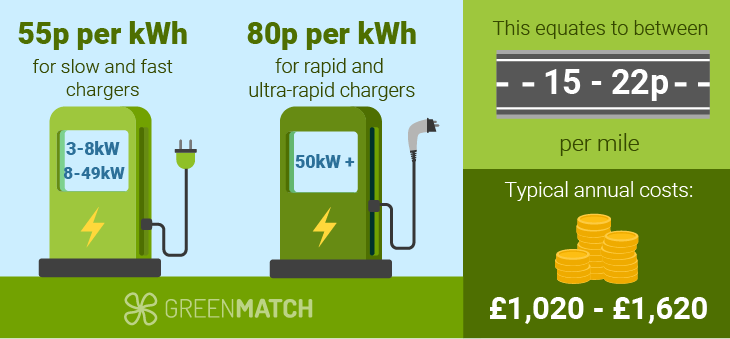
Typical annual costs (depending on charging habits) can range from £1,020 - £1,620, compared to the average costs for a combustion engine vehicle, estimated at £1,540.
Industry suppliers Pod Point recommends that you calculate the average cost of a full charge for your own EV using this formula:
Tariff (28p/kWh) x Battery size (100kWh) ÷ 100 = Cost to fully charge (£28.00)
Below are some typical costs, as of December 2023, that you might expect to pay for a rapid charge using various public network suppliers.
| Rapid/Ultra Rapid Networks | Pay As You Go Price | Full Charge Approximates* |
|---|---|---|
| Instavolt | 85p/kWh | £51 |
| Bp Pulse | 79p/kWh | £47 |
| Genie Point | 79p/kWh | £47 |
| MFG | 79p/kWh | £47 |
| Grid Serve | 79p/kWh | £47 |
| Osprey | 79p/kWh | £47 |
| ESB Energy | 74p/kWh | £44 |
| Pod Point | 69p/kWh | £41 |
| Tesla Supercharger | 64p/kWh | £38 |
| ChargePlace Scotland | Free - £1/kWh | £0 - £60 |
Home EV charger installation guide
With the rise of vehicles as an option, many drivers are considering installing electric vehicle charging stations at home and budget-friendly charging solutions. Here are some steps in setting up an electric vehicle charger points
Choosing the right home EV charger
When selecting a home EV charger, consider the following factors:
- Charging speed: Most home chargers are 7kW, providing about 25-30 miles of range per hour of charging. Some models offer 3.6kW or 22kW options.
- Smart features: Look for chargers with Wi-Fi connectivity, scheduling capabilities, and energy monitoring.
- Tethered vs untethered: Decide whether you want a charger with a built-in cable or one that allows you to use your own.
- Brand reputation: UK popular brands include Pod Point, Wallbox, and Ohme.
Home EV Charger Installation Requirements
Before installation, ensure you meet these requirements:
- Off-street parking: Most installations require dedicated off-street parking.
- Homeownership or landlord permission: You'll need approval if you're renting.
- Electrical capacity: Your home should have sufficient electrical capacity for the charger.
- Wi-Fi connection: Most smart chargers require internet connectivity.
EV charger installation process
While it might be tempting to DIY, professional installation is crucial for safety and warranty reasons. Here's what to expect:
- Site survey: An electrician assesses your home's electrical capacity and ideal charger location.
- Electrical upgrades: If needed, your fusebox might require an upgrade to handle the additional load.
- Charger mounting: The unit is securely fixed to your wall, typically near your parking space.
- Wiring and testing: The charger is connected to your electricity supply and thoroughly tested.
Home EV Charger Installation Costs
Installation costs in the UK typically range from £300 to £1,000, depending on complexity. Factors affecting cost include:
- Cable length required
- Any necessary electrical upgrades
- Charger type and features
Benefits of home EV charging
Installing a home EV charger offers numerous advantages:
- Convenience of charging at home
- Lower charging costs compared to public stations
- Increased property value
- Potential for integration with solar panels or time-of-use tariffs
Choosing a qualified installer
Ensure your installer is OZEV-approved and registered with a competent person scheme like NICEIC or NAPIT. This guarantees compliance with UK electrical regulations and safety standards.
Optimising your charging
To make the most of your home EV charger:
- Off-peak charging: Take advantage of lower electricity rates during off-peak hours.
- Solar integration: Some chargers can prioritise solar energy for charging if you have solar panels.
- Load balancing: Smart chargers can adjust charging speed based on your home's electricity usage.
Remember, home charging is typically much cheaper than public charging, with average costs around 5-14p per kWh compared to 20-40p per kWh at public stations.
Best home EV chargers in the UK
Here, we compare the best home EV chargers in the UK, highlighting their costs, power capacity and notable features. It's worth mentioning that the prices and functionalities can differ based on the models and setups. Additionally, it's essential to consider that installation expenses are usually not factored into these prices and may fluctuate depending on the situation.
| Charger Model | Price (£) Without Installation | Power Output | Key Features |
|---|---|---|---|
| Easee One | From £587 | 7.4kW | Tethered/untethered option, stylish design, simple app, solar integration |
| Ohme Home Pro | From £799 | 7.4kW | Tethered, smart charging features, dynamic load balancing |
| Zappi | From £745 | 7kW | Solar compatibility, eco-smart charging modes |
| Andersen A2 | From £1,199 | Up to 22kW | Customisable design, hidden cable storage, app control |
| Pod Point Solo 3 | From £799 | 3.6kW/7kW | Robust design, over-the-air updates, 3-year warranty |
| Wallbox Pulsar Max | From £745 | 7.4kW | Compact design, power sharing, solar integration |
| EVIOS One | From £675 | 7.4kW | Touchscreen interface, easy-to-use app, solar compatibility |
| Rolec QUBEV Smart | From £595 | 7.4kW | Cost-effective, OCPP compliant, load balancing |
| Simpson & Partners Home Series | From £649 | 7.4kW | Customisable design, long cable options, solar compatibility |
| Hypervolt Home 3 Pro | From £690 | 7kW | High customer satisfaction, voice control via Alexa |
| EO Mini Pro 3 | From £966 | 7.2kW | Compact and unobtrusive, smart home integration |
| Indra Smart Pro | From £895 | 7.4kW | Solar compatibility, vehicle-to-home (V2H) ready |
Future of EV chargers
As the landscape of electric vehicles continues to evolve in the UK, concerns have risen about our ability to keep up with the need for ample charging stations. As we’ve seen, the latest number of stations nationwide has surpassed 50,000 public use chargers.
This increase shows that the demand and supply for electric vehicles are stronger than ever. With the announcement of recent Government policies, we can only expect this interest to grow in the coming years.
Using solar panels to power electric vehicle (EV) charging stations offers several benefits. Solar-powered EV charging stations guarantee a 100% carbon-neutral footprint, as the electricity is generated from renewable solar energy rather than fossil fuels.
Companies like BMW, Mitsubishi, and Whole Foods have implemented innovative solar-powered charging station designs, combining solar panels with visually appealing structures like canopies and arches to provide shade while charging EVs with clean energy.
The vast offering of different charging types, from home installation to free top-up supermarket stops, makes chargers much more accessible. Opening more charging ways could encourage people to switch to a highly efficient, zero-emissions vehicle. For instance, for home EV charging, a typical setup includes rooftop solar panels, an inverter to convert the DC power to AC, and a Level 2 EV charger compatible with the solar system, allowing homeowners to charge their EVs using renewable solar energy.
Although variable, the costs associated with charging are becoming increasingly competitive and are often offset by long-term savings in fuel. Moreover, the growing number of charging points and strategic installations at key locations, such as motorways and supermarkets, make electric vehicle ownership more convenient and practical.
As the country takes steps towards achieving its sustainability goals, the continued evolution of our charging infrastructure will undoubtedly be a key driver in accelerating the widespread adoption of clean and sustainable transportation.
Frequently asked questions
No, home EV chargers should always be installed by a certified electrician or qualified installer to ensure all regulations are met. You can find many public-use chargers across the country while you wait!
The Easee One, Simpson & Partners and Pod Point, frequently rank highly for the best home EV charger. Learn more about all types of EV chargers available.
BP Pulse, Pod Point and InstaVolt are among the UK’s most reputable EV charger companies. Check out their typical costs and compare tariffs.
Charging at free public-use points is the cheapest way. These can usually be found at supermarkets, hotels or other public spaces. Check which charge connections are available ahead of time to avoid issues.

Becky is an experienced SEO content writer specialising in sustainability and renewable trends. Her background in broadcast journalism inspires reliable content to help readers live more sustainably every day.
We strive to connect our customers with the right product and supplier. Would you like to be part of GreenMatch?




